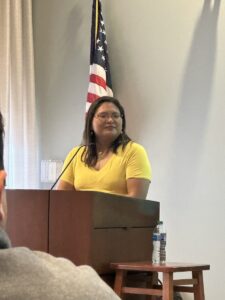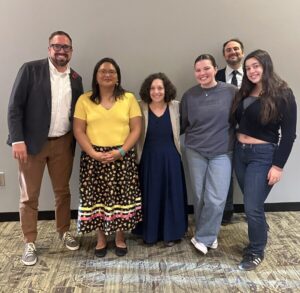What does it mean for something to be “because of love”?
Melanie A. Frye addressed this big question on February 6 as she discussed her work with the Mvskoke (Creek/Seminole) Language and her Native youth language educational program with the Emory community. Language is inextricably tied to one’s history, community, and identity. As such, she began her lecture in the Mvskoke language, introducing herself as a citizen of the Muscogee (Creek) Nation, a member of the Bird Clan, and from her tribal town of Eufaula on the Canadian River.
 Mvskoke, like other Muskogean languages, roots itself in the Muscogee homeland and continues in five Mvskoke-speaking sovereign Nations in present-day Oklahoma. It is a language built on relationality between the speaker and their subjects. Just as clans hold dominant kinship and daughter towns maintain their ties to their mothers even after the Indian Removal Act of 1830. Some towns did not survive the displacement, however, their people carried on by reforming their kinships into new towns. Ancestral homelands still connect to Muscogee people today by functioning as ceremonial grounds.The Mvskoke word etvlwv translates into English as “tribal town” or “band” among Seminoles. . Etvlwv connotes that each town has a sovereign identity, with some like Thlopthlocco, receiving federal recognition as a tribal governance.
Mvskoke, like other Muskogean languages, roots itself in the Muscogee homeland and continues in five Mvskoke-speaking sovereign Nations in present-day Oklahoma. It is a language built on relationality between the speaker and their subjects. Just as clans hold dominant kinship and daughter towns maintain their ties to their mothers even after the Indian Removal Act of 1830. Some towns did not survive the displacement, however, their people carried on by reforming their kinships into new towns. Ancestral homelands still connect to Muscogee people today by functioning as ceremonial grounds.The Mvskoke word etvlwv translates into English as “tribal town” or “band” among Seminoles. . Etvlwv connotes that each town has a sovereign identity, with some like Thlopthlocco, receiving federal recognition as a tribal governance.
Frye reflected on her language journey. Her father–a first language speaker, her great uncle, Ms. Gloria McCarty, her mother–Margaret McCain Moulding, Mr. Galen Cloud, and Mrs. Linda Wood were her Mvskoke mentors, teaching her the grammar, structure, building blocks, and intricacies of the language. Frye has also worked with linguistics Dr. Jack Martin to compile a Mvskoke dictionary which can be accessed at the Emory Library. Frye’s linguistic journey continues at University of Oklahoma, teaching others the Mvskoke language. In teaching the language, Professor Frye initially focused on grammar, nouns, tenses, and verbs, but later transitioned to learning sentences and translations to increase student’s understanding. Now she emphasizes student interactions and building up functional Mvskoke such as verb conjugation which holds more significance compared to English. Frye led an example of sentence constructions and encoded meanings within Mvskoke. 
Not many Mvskoke citizens are first language speakers. The youngest native speaker was already in his 50s. She stressed the importance of Mvskoke youths and Indigenous youths at large to use their language as a part of their sovereignty and culture. No place is this more evident than her work with the youth of the Thlopthlocco Tribal Town. Frye explained that Thlopthlocco was the descendant of their mother tribal town Tukvpvcce. Thlopthlocco received federal recognition as a tribal government in 1939.
With a grant and permission from the Thlopthlocco elders, Frye runs a language and culture camp aimed to develop Native youth’s language and culture connections. For the 2023 session, Frye incorporated more culturally Mvskoke elements such as “Pipē Nocv,” a Mvskoke lullaby created during removal, and Luvc Hopoyet Ayvnks, a story written by Dr. Frye and edited by Mrs. Linda Wood based on “Pipē Nocv.” Over the three days students learned the lullaby through crafts, drawings, and recording themselves singing “Pipē Nocv.” Each student had physical memories of Pipē Nocv to encourage themselves to continue learning and sharing with their parents. As campers mature, Dr. Frye hopes to include these fluent speakers assisting her students during their cultural activities for this coming camp.
Because of love for her community, her language, and her descendants, she embarked on her mission to teach the next generation their history, their language, their culture, and hopefully inspire their future.
Click here to watch the full lecture: Vnokeckv Omēcicen: Because of Love
Click here to learn some Mvskoke words: Mvskoke (Creek) Language Chart
Click here to watch Introduction to Translanguaging, Language Reclamation, and Justice-Oriented Language Pedagogies
